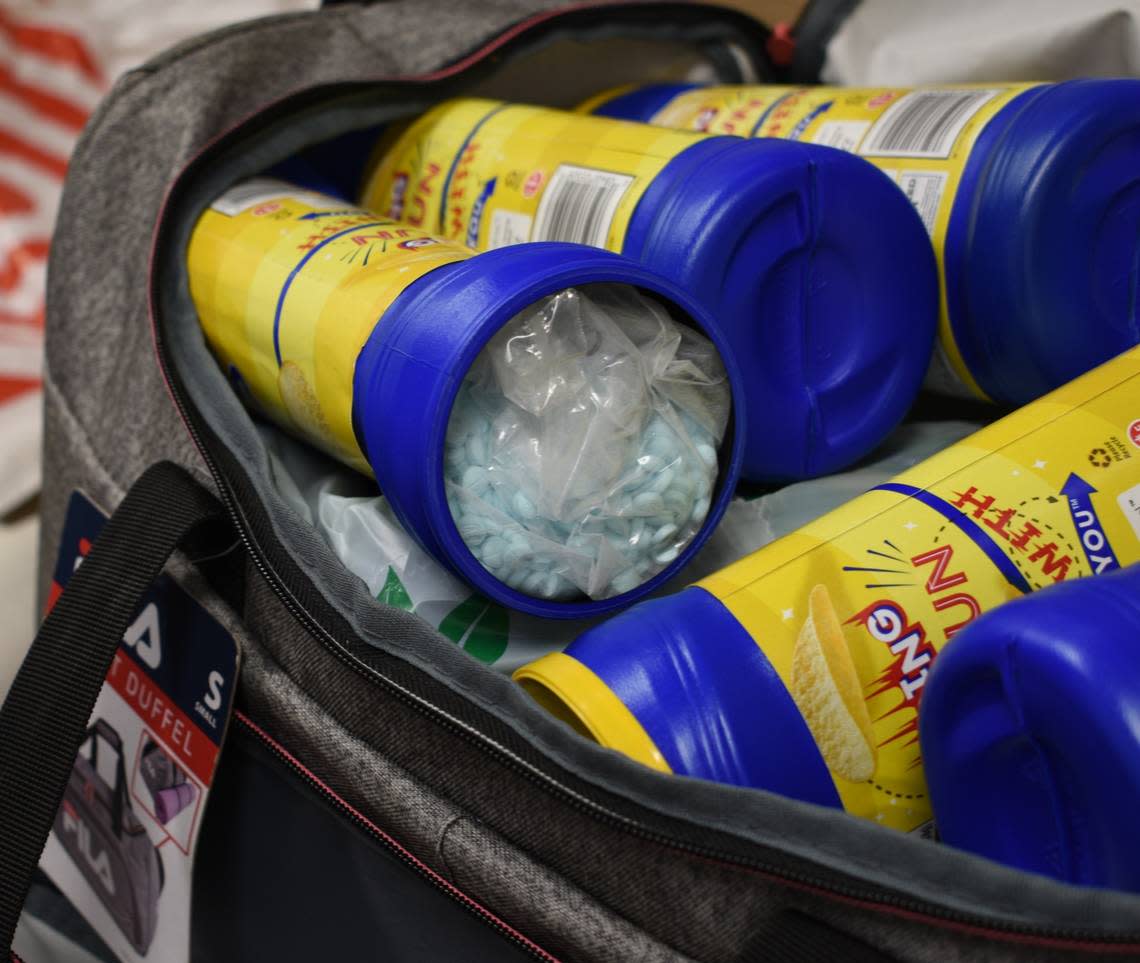10 kilograms of fentanyl found in boxes, potato chip containers in Whatcom. Two arrested
Two men were federally indicted Thursday, July 21, for allegedly importing 91,000 fentanyl pills into Whatcom County.
Juan E. Hernandez-Hernandez and Alejandro Macias-Velazquez each were indicted by a grand jury in the Western District of Washington in Seattle for one count of conspiracy to distribute a controlled substance and one count of possession of a controlled substance with intent to distribute related to the distribution and sale of fentanyl pills, according to federal court documents and a Friday press release from the U.S. Department of Homeland Security.
Hernandez-Hernandez and Macias-Velazquez are detained in a federal detention center pending trial, court records show.
In July, Homeland Security Investigations special agents received information that a transnational criminal organization was importing bulk quantities of fentanyl pills from Mexico into western Washington. A Homeland Security confidential informant told agents they were in contact with a member of the Mexico-based criminal organization who was believed to be in Bellingham, according to court records.
The confidential informant had several phone calls with the Washington-based member, who was later identified as Hernandez-Hernandez, and the two negotiated a deal where Hernandez-Hernandez would deliver 50,000 fentanyl pills in exchange for $125,000, the court records state. When Hernandez-Hernandez disclosed he had 90,000 fentanyl pills, the deal was renegotiated and the informant agreed to pay $185,000 for the pills, records show.
On July 7, the informant and an undercover agent went to a Bellingham coffee shop to retrieve the pills. There, they met Hernandez-Hernandez and they decided to conduct the deal at a Bellingham hotel.
Hernandez-Hernandez and the informant stayed in the hotel parking lot and later, a white Honda Odyssey, driven by Macias-Velazquez, parked next to the informant’s vehicle, the records state.
Macias-Velazquez grabbed a duffle bag from his car and went to put it into the trunk of the informant’s car, and both Macias-Velazquez and Hernandez-Hernandez were arrested.
Agents found several cardboard boxes and potato chip containers that were filled with plastic Ziploc bags that contained small blue pills inside the duffle bag. The pills, which weighed nearly 10 kilograms, were determined to contain fentanyl, the court records state.
Hernandez-Hernandez allegedly admitted he knew the duffle bag contained fentanyl pills, that he was in charge of the drug deal and admitted to acquiring the pills, the records show. He told agents he told Macias-Velazquez to grab the duffle bag from the house they shared and bring it to the hotel.
Macias-Velazquez told agents he didn’t know what was inside the duffle bag and that Hernandez-Hernandez had told him to bring it to the hotel, court records state. Macias-Velazquez said Hernandez-Hernandez agreed to pay him $5,000 for delivering the duffle bag, and that he knew it was “something bad or illegal,” inside the bag, documents show.
“The dangers of fentanyl cannot be understated, more so in an area where there have been recent overdose deaths attributed to fentanyl-laced pills,” Special Agent in Charge Robert Hammer, who oversees Homeland Security operations in the Pacific Northwest, said in a prepared statement.

Fentanyl, a synthetic opioid that is 50 times more potent than heroin and 100 times stronger than morphine, is often used in counterfeit versions of legitimate-looking medications, according to a story in The Guardian about a national study, and it can be used in pills disguised to look like pharmaceutical versions of Percocet, Xanax, Adderall or its most commonly known counterfeit blue “M30” oxycodone form.
Overdose deaths related to fentanyl use have been on the rise both nationally and in Whatcom County.
There were 10 deaths during the month of March this year related to fentanyl use, The Bellingham Herald previously reported.
And out of the 50 drug overdose deaths investigated by the Whatcom County Medical Examiner’s Office in 2021, fentanyl was present in 29 of them, according to the examiner’s 2021 annual report.
The first recognized case in Whatcom County involving fentanyl was in 2018, with four fentanyl-related overdose deaths reported the following year, The Herald previously reported.
In 2020, there was an increase to 23 fentanyl-related overdose deaths.
Seizures of fentanyl-laced pills have also been on the rise, with the Whatcom Gang and Drug Task Force seizing nearly 120,000 fentanyl pills in 2021.
“Street sales of illicit forms of fentanyl are resulting in deaths in Whatcom County and across Washington,” Whatcom County Sheriff Bill Elfo said in the Friday press release. “The street price of the drug has plummeted and it has become widely available in our local community. The Sheriff’s Office works very closely with Homeland Security Investigations and other partners to disrupt the organized criminal enterprises that traffic in this drug. This case illustrates the successes that can be achieved in combating the proliferation of fentanyl when local and federal law enforcement combine forces.”
